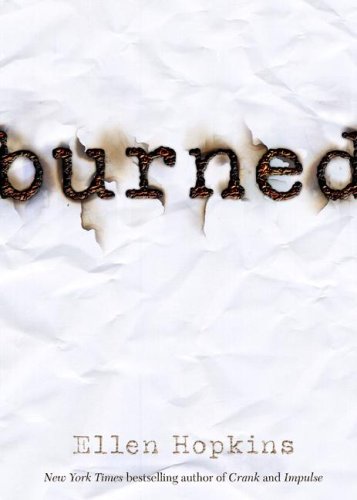 It's hard not to pull out the literary critic's jargon when assessing this novel, but I'm trying not to let the structuralist in me win out over my appreciation of this incredible book, so here's a quick rundown of the plot:
It's hard not to pull out the literary critic's jargon when assessing this novel, but I'm trying not to let the structuralist in me win out over my appreciation of this incredible book, so here's a quick rundown of the plot:Pattyn is a seventeen year old girl, the eldest of seven in a strict Mormon family. Hopkins is staunch in her depiction of Mormon women as submissive to men, naming them as "slaves" in some places, and she brings this to the forefront as Pattyn's primary conflict. After a typical teenage tousle leads Pattyn to be expelled by her abusive father to the countryside of Nevada, she is opened to the realities of life outside of Mormon doctrine. Growing closer to her nurturing and damaged aunt, Pattyn is exposed to the sorrows and joys of a life ruled by personal choice, and not religious law. Finding freedom, "forever love", and a new perspective of herself, Pattyn becomes a new person. The reader shares in this tentative journey as the protaganist reveals the pleasures and revelations she experiences as she emerges from underneath the oppressive influence of her father's misogynistic and abusive interpretation of Mormon doctrine.
Seemingly as soon as she has established herself in her new Nevada home, Pattyn is called to her familial one to take care of the eighth baby her mother has borne. This brings about changes Pattyn dreads, and the relaxation and relief she experienced in her time away from her zealous and abusive father weakens her against his influence.
Featuring a shocking and arguably fitting ending (which I would do no justice to attempt to describe), Burned is both traumatic and beautiful. I wouldn't really label it as a true tragedy, though there are certainly elements of the tragic within its pages.
It is, of course, in my nature to pay homage to Hopkins' incredible poetic structure. To a poetry novice such as myself, the words initially read in a straightforward manner, and very few verses rhyme, or have apparent rhythmic devices. However, the way in which the poetry is laid out invites the prose to be read twice, with a deeper, consolidatory meaning often concealed in the secondary reading of a piece.
Ellen Hopkins' verse novel Burned is a triumph of the genre, and a masterful exposition of the turmoil and joy faced by the protaganist Pattyn as she navigates her way through crises of religion, love and family. Burned presents what feels like a snapshot of the life of a Mormon girl in prose which is innovative both in a literary and visual context. It is a sad tale, but one which is peppered with moments of true joy and lightheartedness. Possibly a very different use of poetry to one you may be accustomed to - at least it was to me.
[It warrants warning, also, that Hopkins' depiction of the Mormon Church is very extreme. It is not a subject I claim to know much about, and I understood the portrayal contextually - that is, as part of a fictional story. Thus, it follows, that I should register my understanding that this is not, by any means, a complete or accurate portrayal of the Mormon Church, but simply an interprative one.]
I'll leave you with this quote from Burned; it is taken from the section of the novel where Pattyn has lost her virginity to the man she truly loves. Her struggle with the religious and personal implications of her decisions are evident in the way she describes it as follows:
I cried for what
I had lost,
my best-kept secret,
given away.
I cried for what
I had gained,
the knowledge of Eden, irrevocably
learned.
Happy reading!
claire. x.